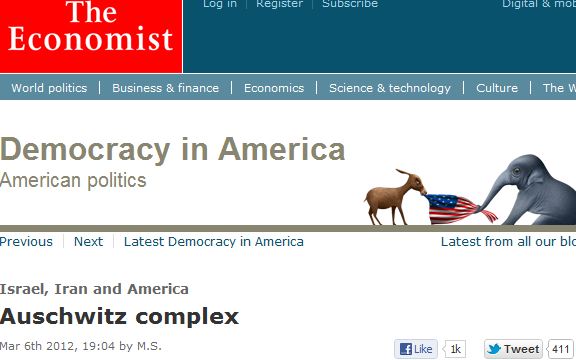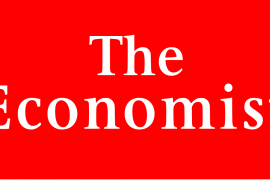Cross posted by Mark Gardner at the blog of the CST
 According to an article by “M.S.” on the Economist blog, Israel and its Prime Minister Binyamin Netanyahu fear Iran because they suffer from “Auschwitz complex”. Furthermore, this “Auschwitz complex” supposedly links with the Jewish festivals of Purim and Passover. At its end, we are told that Netanyahu’s fears over Iran, reveal his “ghetto mentality”.
According to an article by “M.S.” on the Economist blog, Israel and its Prime Minister Binyamin Netanyahu fear Iran because they suffer from “Auschwitz complex”. Furthermore, this “Auschwitz complex” supposedly links with the Jewish festivals of Purim and Passover. At its end, we are told that Netanyahu’s fears over Iran, reveal his “ghetto mentality”.
The Holocaust, Jewish history and religion are crucial to the Israeli national psyche and the decisions of its leaders: but this is not a serious article on that multifaceted subject. Instead, this article’s lack of accuracy and sensitivity make it little more than an abuse of the Holocaust and Jewish religion in order to stick two fingers up at Netanyahu. (The Economist is perfectly entitled to criticise Netanyahu: but to do so on the premise of supposed Jewish psychological, religious and historical traits takes us into altogether different territory.)
To begin, the article’s title, “Auschwitz complex”, belongs more on the websites of Gilad Atzmon (eg “Swindler’s List”) and David Irving (eg “Auschwitz: the End of the Line”) than it does on that of the Economist. It is a cold joke, poking fun at the Holocaust to evoke a wry grin and not a little coldness in the heart of the reader.
The article opens with an attack upon Netanyahu for telling President Obama (in the context of Iran’s nuclear ambitions) that Israel seeks to remain “master of its fate”. The author ridicules the notion that any individual country, especially one in conflict with its neighbours, can be master of its own fate in an inter-dependent world. This is a facile straw man argument that sets the tone for what follows.
Next, Israel and Netanyahu are blamed for every failure of the Oslo Peace Accords and for the ongoing conflict situation. There is nothing unusual about such condemnation, but in this context it is required by the author to justify the notion of an “Auschwitz complex”, whereby Israel’s and Netanyahu’s actions are presented as a mix of premeditated ideological malice and unwarranted paranoia. (It is possible that the title, “Auschwitz complex” was written by the Economist, not the author. Nevertheless, the article is woeful; and if the Economist chose the headline, then that is, in a sense, even more depressing.)
Having built the platform, we get the crux of the article:
Having trapped themselves in a death struggle with Palestinians that they cannot acknowledge or untangle, Israelis have psychologically displaced the source of their anxiety onto a more distant target: Iran…the notion that it represents a new Holocaust is overstated…But Iran makes an appealing enemy for Israelis because, unlike the Palestinians, it can be fitted into a familiar ideological trope from the Jewish national playbook: the eliminationist anti-Semite.
Where to begin with this? For the sake of brevity, two points:
Firstly, it is plain wrong to say that Palestinians cannot be “fitted into a familiar ideological trope from the Jewish playbook: the eliminationist anti-Semite”. Palestinian and Arab threats to destroy Israel have consistently formed an “ideological trope” in the Israeli psyche, just like today’s Iranian threat. Prior to the state’s creation, the Grand Mufti of Jerusalem was (and still is) reviled in this manner, just as Egypt’s President Nasser was in the 1950 and 60s. Then, Menachem Begin’s leadership of Israel (1977-1983) was marked by his characterisation of Yasser Arafat and the PLO as Nazi inheritors. Similarly, the Hamas charter bears comparison with any“eliminationist” text.
Secondly, as the ever-excellent Professor Alan Johnson points out, “let us note that far from the concept of eliminationist antisemitism – being part of some ‘Jewish national playbook,’ it was the absence of such an orientating concept among the Jews of Europe that made the nature of the Nazi assault so difficult to understand and respond to.”
The author, “M.S.”, then draws upon Netanyahu’s presentation to Obama of the Book of Esther, which tells how a Persian king was persuaded by (the Jewish) Queen Esther to prevent the massacre of his country’s Jews. The story is read at the festival of Purim, which coincided with the Netanyahu-Obama meeting. We are then told how Passover includes the “Ve-hi she-amdah” prayer, “Because in every generation they rise up to destroy us, but the Holy One, Blessed be He, delivers us from their hands”.
The article says that Netanyahu “seems to be wooing Mr Obama and the American public just as effectively” and that this “resembles” a “doomed marriage” in which
the more stubborn and unstable partner drags the other into increasingly delusional and dangerous projects whose disastrous results seem only to legitimate their paranoid outlook.
No consideration is given to Iran’s past and present actions. No mention is made of its nuclear programme, its goal of regional domination, its leader’s apocalyptic outbursts, its denial of the Holocaust, its terrorism against Jews and Israelis. It is simply all down to Israeli delusions, which rest upon paranoid Jewish religious and Holocaust foundations. This is superior to Gilad Atzmon’s work, such as “Trauma Queen [Esther]…Pre-Traumatic Gas Syndrome…From Purim to AIPAC”, but it is still reminiscent of it. Surely the Economist ought to have far higher standards than the dross psychology and selective facts that comprise and compromise this article.
Finally, the author signs off with a couple more digs at Netanyahu, claiming his concerns over Iran (and Palestinians), and his Book of Esther gift to Obama reveal the failure to fulfil “the Zionist mission…to give the Jewish people control over its destiny”, and his being “still in” “the ‘Ghetto mentality’”.
By comparison, the Jerusalem Post (traditionally a somewhat more pro-Israel publication than the Economist), noted that against American advice, Israel had very successfuly declared independence (1948), launched the Six Day War (1967) and destroyed the Iraqi nuclear programme (1981). The editorial also had this to say about Netanyahu, the Book of Esther, Zionism and Iran:
That message from the Megila [Book of Esther] that encourages Jews to proactively take their fate into their own hands is also the story of the Zionist movement and the State of Israel. Refusing any longer to reconcile themselves to traditional passivity vis-à-vis the creation of a sovereign state, Jews who adhered to Zionism called to take hold of their own destiny.
…Unfortunately, they failed to achieve their goal before the Holocaust, which proved beyond a doubt Zionism’s premise that the Jewish people could not rely on the compassion of others.
…The message of the Megila is not one of militarism.
The lesson that Netanyahu wanted to impart to Obama was not that Israel must launch an attack against Iran to stop its mullahs from developing nuclear weapons.
However, the Megila does value Jewish action over Jewish passivity and recognizes that whether through ingenuity, good luck, divine intervention or a combination of them all the Jewish people, when given the chance, have managed to foil the plans of their many enemies. Let’s hope we have the same success in facing the Iranian challenge.
Related articles
- AKUS @ AIPAC Conf: House leader vows Congress will declare red lines for action on Iran (cifwatch.com)
- Oh, That’s It – Just That Pesky Ol’ Auschwitz Complex (Victor Davis Hanson)




